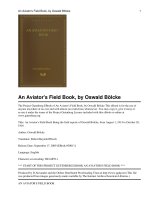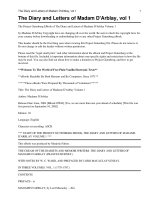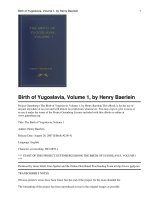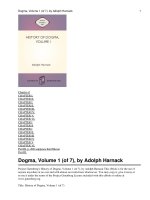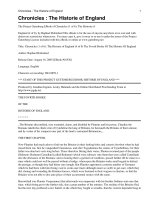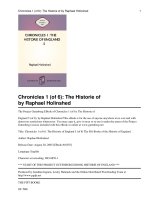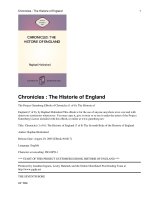Henry of Monmouth, Volume 1 Memoirs of Henry the Fifth doc
Bạn đang xem bản rút gọn của tài liệu. Xem và tải ngay bản đầy đủ của tài liệu tại đây (689.03 KB, 170 trang )
CHAPTER I.
CHAPTER II.
CHAPTER III.
CHAPTER IV.
CHAPTER V.
CHAPTER VI.
CHAPTER VII.
CHAPTER VIII.
CHAPTER IX.
CHAPTER X.
CHAPTER XI.
CHAPTER XII.
CHAPTER XIII.
CHAPTER XIV.
CHAPTER XV.
CHAPTER XVI.
CHAPTER I.
CHAPTER II.
CHAPTER III.
CHAPTER IV.
CHAPTER V.
CHAPTER VI.
CHAPTER VII.
CHAPTER VIII.
CHAPTER IX.
CHAPTER X.
PART IN
CHAPTER XI.
CHAPTER XII.
CHAPTER XIII.
CHAPTER XIV.
1
CHAPTER XV.
CHAPTER XVI.
Monmouth, Volume 1, by J. Endell Tyler
Project Gutenberg's Henry of Monmouth, Volume 1, by J. Endell Tyler This eBook is for the use of anyone
anywhere at no cost and with almost no restrictions whatsoever. You may copy it, give it away or re-use it
under the terms of the Project Gutenberg License included with this eBook or online at www.gutenberg.org
Title: Henry of Monmouth, Volume 1 Memoirs of Henry the Fifth
Author: J. Endell Tyler
Release Date: January 31, 2007 [EBook #20488]
Language: English
Character set encoding: ISO-8859-1
*** START OF THIS PROJECT GUTENBERG EBOOK HENRY OF MONMOUTH, VOLUME 1 ***
Produced by Christine P. Travers and the Online Distributed Proofreading Team at
[Transcriber's note: Obvious printer's errors have been corrected. The original spelling has been retained.
Printer's error corrected: - Page 18: portophorium to portiphorium. - Page 27: applition to application. - Page
42: chace to chase. - Page 80: ' changes to ".
Definition: - Dº: Ditto.]
[Illustration: Henri of Monmouth]
HENRY OF MONMOUTH:
OR,
MEMOIRS
OF THE LIFE AND CHARACTER OF
HENRY THE FIFTH,
AS
PRINCE OF WALES AND KING OF ENGLAND.
BY J. ENDELL TYLER, B.D.
RECTOR OF ST. GILES IN THE FIELDS.
Monmouth, Volume 1, by J. Endell Tyler 2
"Go, call up Cheshire and Lancashire, And Derby hills, that are so free; But neither married man, nor widow's
son; No widow's curse shall go with me."
IN TWO VOLUMES.
VOL. I.
LONDON: RICHARD BENTLEY, NEW BURLINGTON STREET, Publisher in Ordinary to Her Majesty.
1838.
LONDON: PRINTED BY SAMUEL BENTLEY, Dorset Street, Fleet Street.
TO HER MOST EXCELLENT MAJESTY THE QUEEN. (p. iii)
MADAM,
The gracious intimation of your Royal pleasure that these Memoirs of your renowned Predecessor should be
dedicated to your Majesty, while it increases my solicitude, suggests at the same time new and cheering
anticipations. I cannot but hope that, appearing in the world under the auspices of your great name, the
religious and moral purposes which this work is designed to serve will be more widely and effectually
realised.
* * * * *
Under a lively sense of the literary defects which render these volumes unworthy of so august a patronage, to
one point I may revert with feelings of satisfaction and encouragement. I have gone only (p. iv) where Truth
seemed to lead me on the way: and this, in your Majesty's judgment, I am assured will compensate for many
imperfections.
* * * * *
That your Majesty may ever abundantly enjoy the riches of HIS favour who is the Spirit of Truth, and having
long worn your diadem here in honour and peace, in the midst of an affectionate and happy people, may
resign it in exchange for an eternal crown in heaven, is the prayer of one who rejoices in the privilege of
numbering himself,
Madam,
Among your Majesty's
Most faithful and devoted
Subjects and servants.
J. ENDELL TYLER.
24, Bedford Square, May 24, 1838.
PREFACE. (p. v)
Monmouth, Volume 1, by J. Endell Tyler 3
Memoirs such as these of Henry of Monmouth might doubtless be made more attractive and entertaining were
their Author to supply the deficiencies of authentic records by the inventions of his fancy, and adorn the result
of careful inquiry into matters of fact by the descriptive imagery and colourings of fiction. To a writer, also,
who could at once handle the pen of the biographer and of the poet, few names would offer a more ample field
for the excursive range of historical romance than the life of Henry of Monmouth. From the day of his first
compulsory visit to Ireland, abounding as that time does with deeply interesting incidents, to his last hour in
the now-ruined castle of Vincennes; or rather, from his mother's espousals to the interment of his earthly
remains within the sacred precincts of Westminster, every period teems with animating suggestions. So far,
however, from possessing such adventitious recommendations, the point on which (rather perhaps than any
other) an apology might be expected for this work, is, that it has freely tested by the standard of (p. vi) truth
those delineations of Henry's character which have contributed to immortalize our great historical dramatist.
The Author, indeed, is willing to confess that he would gladly have withdrawn from the task of assaying the
substantial accuracy and soundness of Shakspeare's historical and biographical views, could he have done so
safely and without a compromise of principle. He would have avoided such an inquiry, not only in deference
to the acknowledged rule which does not suffer a poet to be fettered by the rigid shackles of unbending facts;
but from a disinclination also to interfere, even in appearance, with the full and free enjoyment of those
exquisite scenes of humour, wit, and nature, in which Henry is the hero, and his "riotous, reckless
companions" are subordinate in dramatical excellence only to himself. The Author may also not unwillingly
grant, that (with the majority of those who give a tone to the "form and pressure" of the age) Shakspeare has
done more to invest the character of Henry with a never-dying interest beyond the lot of ordinary monarchs,
than the bare records of historical verity could ever have effected. Still he feels that he had no alternative. He
must either have ascertained the historical worth of those scenic representations, or have suffered to remain in
their full force the deep and prevalent impressions, as to Henry's principles and conduct, which owe, if not
their origin, yet, at least, much of their universality and vividness, to Shakspeare. (p. vii) The poet is dear, and
our early associations are dear; and pleasures often tasted without satiety are dear: but to every rightly
balanced mind Truth will be dearer than all.
* * * * *
It must nevertheless be here intimated, that these volumes are neither exclusively, nor yet especially, designed
for the antiquarian student. The Author has indeed sought for genuine information at every fountain-head
accessible to him; but he has prepared the result of his researches for the use (he would trust, for the
improvement as well as the gratification,) of the general reader. And whilst he has not consciously omitted
any essential reference, he has guarded against interrupting the course of his narrative by an unnecessary
accumulation of authorities. He is, however, compelled to confess that he rises from this very limited sphere
of inquiry under an impression, which grew stronger and deeper as his work advanced, that, before a history
of our country can be produced worthy of a place among the records of mankind, the still hidden treasures of
the metropolis and of our universities, together with the stores which are known to exist in foreign libraries,
must be studied with far more of devoted care and zealous perseverance than have hitherto been bestowed
upon them. That the honest and able student, however unwearied in zeal and industry, may be supplied with
the indispensable means of verifying what (p. viii) tradition has delivered down, enucleating difficulties,
rectifying mistakes, reconciling apparent inconsistencies, clearing up doubts, and removing that mass of
confusion and error under which the truth often now lies buried, our national history must be made a subject
of national interest. It is a maxim of our law, and the constant practice of our courts of justice, never to admit
evidence unless it be the best which under the circumstances can be obtained. Were this principle of
jurisprudence recognised and adopted in historical criticism, the student would carefully ascend to the first
witnesses of every period, on whom modern writers (however eloquent or sagacious) must depend for their
information. How lamentably devoid of authority and credit is the work of the most popular and celebrated of
our modern English historians in consequence of his unhappy neglect of this fundamental principle, will be
made palpably evident by the instances which could not be left unnoticed even within the narrow range of
these Memoirs. And the Author is generally persuaded that, without a far more comprehensive and intimate
acquaintance with original documents than our writers have possessed, or apparently have thought it their duty
Monmouth, Volume 1, by J. Endell Tyler 4
to cultivate, error will continue to be propagated as heretofore; and our annals will abound with surmises and
misrepresentations, instead of being the guardian depositories of historical verity. Only by the
acknowledgment and application of the principle here advocated will (p. ix) England be supplied with those
monuments of our race, those "POSSESSIONS FOR EVER," as the Prince of Historians[1] once named them,
which may instruct the world in the philosophy of moral cause and effect, exhibit honestly and clearly the
natural workings of the human heart, and diffuse through the mass of our fellow-creatures a practical
assurance that piety, justice, and charity form the only sure groundwork of a people's glory and happiness;
while religious and moral depravity in a nation, no less than in an individual, leads, (tardily it may be and
remotely, but by ultimate and inevitable consequence,) to failure and degradation.
[Footnote 1: Thucydides.]
In those portions of his work which have a more immediate bearing upon religious principles and conduct, the
Author has not adopted the most exciting mode of discussing the various subjects which have naturally fallen
under his review. Party spirit, though it seldom fails to engender a more absorbing interest for the time, and
often clothes a subject with an importance not its own, will find in these pages no response to its sentiments,
under whatever character it may give utterance to them. In these departments of his inquiry, to himself far the
most interesting, (and many such there are, especially in the second volume,) the Author trusts that he has
been guided by the Apostolical maxim of "SPEAKING THE TRUTH IN LOVE." He has not willingly
advanced a single sentiment which should unnecessarily (p. x) cause pain to any individual or to any class of
men; he has not been tempted by morbid delicacy or fear to suppress or disguise his view of the very TRUTH.
The reader will readily perceive that, with reference to the foreign and domestic policy of our country, the
advances of civilization, the manners of private life, as well in the higher as in the more humble grades of
society, the state of literature, the progress of the English constitution, the condition and discipline of the
army, which Henry greatly improved, and the rise and progress of the royal navy, of which he was virtually
the founder, many topics are either purposely avoided, or only incidentally and cursorily noticed. To one point
especially (a subject in itself most animating and uplifting, and intimately interwoven with the period
embraced by these Memoirs,) he would have rejoiced to devote a far greater portion of his book, had it been
compatible with the immediate design of his undertaking; THE PROMISE AND THE DAWN OF THE
REFORMATION.
* * * * *
However the value of his labours may be ultimately appreciated, the Author confidently trusts that their
publication can do no disservice to the cause of truth, of sound morality, and of pure religion. He would hope,
indeed, that in one point at least the power of an (p. xi) example of pernicious tendency might be weakened by
the issue of his investigation. If the results of these inquiries be acquiesced in as sound and just, no young man
can be encouraged by Henry's example (as it is feared many, especially in the higher classes, have been
encouraged,) in early habits of moral delinquency, with the intention of extricating himself in time from the
dominion of his passions, and of becoming, like Henry, in after-life a pattern of religion and virtue, "the
mirror of every grace and excellence." The divine, the moralist, and the historian know that authenticated
instances of such sudden moral revolutions in character are very rare, exceptions to the general rule; and
among those exceptions we cannot be justified in numbering Henry of Monmouth.
He was bold and merciful and kind, but he was no libertine, in his youth; he was brave and generous and just,
but he was no persecutor, in his manhood. On the throne he upheld the royal authority with mingled energy
and mildness, and he approved himself to his subjects as a wise and beneficent King; in his private individual
capacity he was a bountiful and considerate, though strict and firm master, a warm and sincere friend, a
faithful and loving husband. He passed through life under the habitual sense of an overruling Providence; and,
in his premature death, he left us the example of a Christian's patient and pious resignation to the Divine Will.
As long as he lived, he was (p. xii) an object of the most ardent and enthusiastic admiration, confidence, and
Monmouth, Volume 1, by J. Endell Tyler 5
love; and, whilst the English monarchy shall remain among the unforgotten things on earth, his memory will
be honoured, and his name will be enrolled among the NOBLE and the GOOD.
TABLE OF THE PRINCIPAL EVENTS, (p. xiii)
IN THEIR CHRONOLOGICAL ORDER.
[*] Those years, months, or days, respectively, to which an asterisk is attached, are not considered to have
been so fully ascertained as the other dates.
1340* Feb.* John of Gaunt born. 1340} Earl of Northumberland, Hotspur's father, born, 1341} before Nov.
19, 1341. 1359 May 19, John of Gaunt married to Blanche. 1358} Owyn Glyndowr born, before Sept. 3,
1359. 1359} 1366 April 6, Henry Bolinbroke born. 1365} May 20,* Henry Percy (Hotspur) born before 30th
Oct. 1366. 1366} 1367 Jan. Richard II. born at Bourdeaux. 1369* Blanche, wife of John of Gaunt died. 1371*
John of Gaunt married Constance. 1376 June 8, Edward the Black Prince died. 1377 June 21, King Edward
III. died. 1378 Nov. Hotspur first bore arms at Berwick. 1381 Bolinbroke nearly slain by the rioters. 1382
Richard II. married to Queen Anne. 1384 Dec. 31, Wickliffe's death. 1386* Bolinbroke married Mary Bohun.
1387 John of Gaunt went to Spain. 1387* Aug. 9,* HENRY born at MONMOUTH. 1388 Hotspur taken
prisoner by the Scots. 1388 Thomas Duke of Clarence born. 1389 Nov. 9, Isabel, Richard II.'s wife, born.
1389* Nov.* John of Gaunt returned from Spain. (p. xiv) 1389* John Duke of Bedford born. 1390* Humfrey
Duke of Gloucester born. 1390} Bolinbroke visited Barbary. 1391} 1392} Bolinbroke visited Prussia and the
Holy Sepulchre. 1393} 1394* Mary, HENRY's mother, died. 1394* Constance, John of Gaunt's wife, died.
1394 June 7, Anne, Richard II.'s Queen, died. 1396 John of Gaunt recalled from Acquitaine by Richard II.
1396 John of Gaunt married Katharine Swynford. 1397 Arundel, Archbishop of Canterbury, banished. 1397
Sept. 29, Bolinbroke created Duke of Hereford. 1397* John Oldcastle, Lord Cobham, banished. 1397 Nov. 4,
Richard II. married to Isabel. 1398* Henry of Monmouth resided in Oxford. 1398 July 14, Henry Beaufort
consecrated Bishop of Lincoln. 1398 Sept. 16, Bolinbroke and Norfolk at Coventry. 1398 Bolinbroke
banished. 1399 Feb. 3, John of Gaunt died. 1399 May 29, Richard II. sailed for Ireland. 1399 June 23,
HENRY of Monmouth knighted. 1399 June 28, News of Bolinbroke's designs reached London. 1399 July 4,
Bolinbroke landed at Ravenspur. 1399 August, HENRY shut up in Trym Castle. 1399 August, Richard landed
at Milford. 1399 Aug. 14, Richard fell into Bolinbroke's hands. 1399 August, Bolinbroke sent to Ireland for
HENRY. 1399 August, Death of the young Duke of Gloucester. 1399 Sept. 1, Bolinbroke brought Richard
captive to London. 1399 Oct. 1, Richard's resignation of the crown read in Parliament. 1399 Oct. 13,
Bolinbroke crowned as Henry IV. (p. xv) 1399 Oct. 15, HENRY created PRINCE of Wales. 1400 Jan. 4,
Conspiracy against the King at Windsor. 1400* Feb. 14,* Richard II. died at Pontefract. 1400* Oct. 25,*
Chaucer died. 1400 June Henry IV. proceeded to Scotland. 1400 June 23, Lord Grey of Ruthyn's letter to
HENRY. 1400 Sept. 19, First proclamation against the Welsh. 1400 Owyn Glyndowr in open rebellion. 1401
HENRY in Wales, before April 10. 1401 April 10, Hotspur's first Letter. 1401* Sept. 13,* KATHARINE,
HENRY's Queen, born. 1401* Nov. 11,* Restoration of Isabel. 1402 April 3, Henry IV. espoused to Joan of
Navarre. 1402 June 12,* Edmund Mortimer taken prisoner. 1432 Sept. 14, Battle of Homildon. 1402* Nov.
30,* Edmund Mortimer married to a daughter of Owyn Glyndowr. 1403 March 7, HENRY appointed
Lieutenant of Wales. 1403* May 30, HENRY's Letter to the Council. 1403 July 21, Battle of Shrewsbury.
1404 May 10, Glyndowr dated "the fourth year of our Principality." 1404 June 10, Welsh with Frenchmen
overran Archenfield. 1404 June 25, HENRY's letter to his father. 1404 Oct. 6, Parliament at Coventry. 1405
Feb. 20, Sons of the Earl of March stolen from Windsor. 1405 March 1, Crown settled on HENRY and his
brothers. 1405 March 11, Battle of Grosmont. 1405 May, Revolt of the Earl of Northumberland and Bardolf.
1405 June 8, Scrope, Archbishop of York, beheaded. 1406 June 7, Testimony of the Commons to HENRY's
excellences. 1406* June 29,* Isabel married to Angouleme. 1407* Nov. 1,* HENRY went to Scotland. 1408
Feb. 28,* Earl of Northumberland, Hotspur's father, fell (p. xvi) in battle. 1408 July 8, HENRY in London, as
President of the Council. 1409 Feb. 1, HENRY, Guardian of the Earl of March. 1409 Feb. 28, HENRY,
Warden of Cinque Ports and Constable of Dover. 1409* Sept. 13,* Death of Isabel, Richard II.'s widow. 1410
March 5, Warrant for the burning of Badby. 1410 March 18, HENRY, Captain of Calais. 1410 June 16,
Monmouth, Volume 1, by J. Endell Tyler 6
HENRY sate as President of the Council. 1410 June 18, Dº. dº. 1410 June 19, Dº. dº. 1410 June 23, Affray in
Eastcheap, by the Lords Thomas and John, his brothers. 1410 July 22, HENRY, as President. 1410 July 29,
Dº. 1410 July 30, Dº. 1411 March 19, HENRY with his father at Lambeth. 1411 August,* Duke of Burgundy
obtained succour. 1411 Nov. 3, Parliament opened. 1411 Nov. 10, Battle of St. Cloud. 1412 May 18, Treaty
with the Duke of Orleans. 1412* June 30,* HENRY came to London attended by "Lords and Gentils." 1412
July 9, The Lord Thomas created Duke of Clarence. 1412* Sept. 23,* He came again with "a huge people."
1413 Feb. 3, Parliament opened. 1413 March 20, Henry IV. died. 1413 April 9, HENRY V. CROWNED.
1413 May 15, Parliament at Westminster. 1413 June 26, Convocation of the Clergy. 1413 Lord Cobham cited.
1413 Lord Cobham escaped from the Tower. 1414 Jan. 10, Affair of St. Giles' Field. 1414 April 20,
Parliament at Leicester. 1414 HENRY founded Sion and Shene. 1414 Council of Constance. 1415 May 4, The
Council of Constance condemned Wickliffe's (p. xvii) memory, and commanded the exhumation of his bones.
1415 July 6, John Huss condemned. 1415 July 20, Conspiracy at Southampton. 1415 Aug. 11, HENRY sailed
for Normandy. 1415 Sept. 15, Death of Bishop of Norwich in the camp. 1415 Sept. 22, Surrender of Harfleur.
1415 Clayton and Gurmyn burnt for heresy. 1415 Oct. 25, Battle of AGINCOURT. 1415 Nov. 16, HENRY
returned to England. 1415 Nov. 22, Thanksgiving in London. 1416 April 29, Emperor Sigismund visited
England. 1416 May 30, Jerome of Prague burnt. 1416 Aug. 15, League signed by HENRY and Sigismund.
1417 July 23, HENRY's second expedition. 1417 Sept. 4, Surrender of Caen. 1417 Dec. Execution of Lord
Cobham. 1418 July 1, Rouen besieged. 1419 Jan. 19, Rouen taken. 1419 May 30, HENRY and KATHARINE
first met. 1419* July 7, HENRY's letter concerning Oriel College. 1420 May 30, HENRY and Katharine
married. 1420 July, Katharine lodged in the camp before Melun. 1420 HENRY and Katharine, with the King
and Queen of France, entered Paris. 1421 Jan 31, HENRY and Katharine arrived in England. 1421 Feb 23,
Katharine crowned in Westminster. 1421 March 23, They passed their Easter at Leicester. {Between} 1421
{March &} They travelled through the greater part of England. {May, } 1421 March 23, Death of the Duke of
Clarence. 1421 May 26, Taylor condemned to imprisonment for heresy. 1421 June 1, HENRY left London on
his third expedition. 1421 June 10, HENRY landed at Calais. (p. xviii) 1421 Oct. 6, Siege of Meaux began,
and lasted till the April following. 1421 Dec. 6, HENRY's son born at Windsor. 1422 May 21, Katharine
landed at Harfleur. 1422 HENRY met her at the Bois de Vincennes. 1422 They entered Paris together. 1422
Aug. HENRY left Katharine at Senlis.
1422 Aug. 31, DEATH of HENRY.
1423 March 1, William Taylor burnt for heresy.
CONTENTS OF THE FIRST VOLUME. (p. xix)
Monmouth, Volume 1, by J. Endell Tyler 7
CHAPTER I.
1387-1398.
Henry of Monmouth's Parents. Time and place of his Birth. John of Gaunt and Blanche of Lancaster.
Henry Bolinbroke. Monmouth Castle. Henry's infancy and childhood. His education. Residence in
Oxford. Bolinbroke's Banishment. Page 1
CHAPTER I. 8
CHAPTER II.
1398-1399.
Henry taken into the care of Richard. Death of John of Gaunt. Henry knighted by Richard in Ireland.
His person and manners. News of Bolinbroke's landing and hostile measures reaches Ireland. Indecision
and delay of Richard. He shuts up Henry and the young Duke of Gloucester in Trym Castle. Reflections
on the fate of these two Cousins of Bolinbroke of Richard and of the widowed Duchess of Gloucester.
Page 32
CHAPTER II. 9
CHAPTER III.
(p. xx)
1398-1399.
Proceedings of Bolinbroke from his Interview with Archbishop Arundel, in Paris, to his making King Richard
his prisoner. Conduct of Richard from the news of Bolinbroke's landing. Treachery of Northumberland.
Richard taken by Bolinbroke to London. Page 52
CHAPTER III. 10
CHAPTER IV.
1399-1400.
Richard resigns the Crown. Bolinbroke elected King. Henry of Monmouth created Prince of Wales.
Plot to murder the King. Death of Richard. Friendship between him and Henry. Proposals for a
Marriage between Henry and Isabel, Richard's Widow. Henry applies for an Establishment. Hostile
movement of the Scots. Tradition, that young Henry marched against them, doubted. Page 68
CHAPTER IV. 11
CHAPTER V.
1400-1401.
The Welsh Rebellion. Owyn Glyndowr. His former Life. Dispute with Lord Grey of Ruthyn. That
Lord's Letter to Prince Henry. Hotspur. His Testimony to Henry's presence in Wales, to his Mercy and
his Prowess. Henry's Despatch to the Privy Council. Page 88
CHAPTER V. 12
CHAPTER VI.
(p. xxi)
1403.
Glyndowr joined by Welsh Students of Oxford. Takes Lord Grey prisoner. Hotspur's further Despatches.
He quits Wales. Reflections on the eventful Life and premature Death of Isabel, Richard's Widow.
Glyndowr disposed to come to terms. The King's Expeditions towards Wales abortive. Marriage proposed
between Henry and Katharine of Norway. The King marries Joan of Navarre. Page 108
CHAPTER VI. 13
CHAPTER VII.
1402-1403.
Glyndowr's vigorous Measures. Slaughter of Herefordshire Men. Mortimer taken prisoner. He joins
Glyndowr. Henry implores Succours, Pawns his Plate to support his Men. The King's Testimony to his
Son's conduct. The King, at Burton-on-Trent, hears of the Rebellion of the Percies. Page 129
CHAPTER VII. 14
CHAPTER VIII.
1403.
The Rebellion of the Percies, Its Origin. Letters of Hotspur and the Earl of Northumberland. Tripartite
Indenture between the Percies, Owyn, and Mortimer. Doubts as to its Authenticity. Hotspur hastens from
the North. The King's decisive conduct. He forms a junction with the Prince. "Sorry Battle of
Shrewsbury." Great Inaccuracy of David Hume. Hardyng's Duplicity. Manifesto of the Percies
probably a Forgery. Glyndowr's Absence from the Battle involves neither Breach of Faith nor Neglect of
Duty. Circumstances preceding the Battle. Of the Battle itself. Its immediate consequences. Page 141
CHAPTER VIII. 15
CHAPTER IX.
(p. xxii)
1403-1404.
The Prince commissioned to receive the Rebels into allegiance. The King summons Northumberland.
Hotspur's Corpse disinterred. The Reason. Glyndowr's French Auxiliaries. He styles himself "Prince of
Wales." Devastation of the Border Counties. Henry's Letters to the King, and to the Council.
Testimony of him by the County of Hereford. His famous Letter from Hereford. Battle of Grosmont.
Page 178
CHAPTER IX. 16
CHAPTER X.
1405-1406.
Rebellion of Northumberland and Bardolf. Execution of the Archbishop of York. Wonderful Activity and
Resolution of the King. Deplorable state of the Revenue. Testimony borne by Parliament to the Prince's
Character. The Prince present at the Council-board. He is only occasionally in Wales, and remains for the
most part in London. Page 207
CHAPTER X. 17
CHAPTER XI.
1407-1409.
Prince Henry's Expedition to Scotland, and Success. Thanks presented to him by Parliament. His
generous Testimony to the Duke of York. Is first named as President of the Council. Returns to Wales.
Is appointed Warden of the Cinque Ports and Constable of Dover. Welsh Rebellion dwindles and dies.
Owyn Glyndowr's Character and Circumstances; his Reverses and Trials. His Bright Points undervalued.
The unfavourable side of his Conduct unjustly darkened by Historians. Reflections on his Last Days.
Fac-simile of his Seals as Prince of Wales. Page 232
CHAPTER XI. 18
CHAPTER XII.
(p. xxiii)
1409-1412.
Reputed Differences between Henry and his Father examined. He is made Captain of Calais. His
Residence at Coldharbour. Presides at the Council-board. Cordiality still visible between him and his
Father. Affray in East-Cheap. No mention of Henry's presence. Projected Marriage between Henry and
a Daughter of Burgundy. Charge against Henry for acting in opposition to his Father in the Quarrel of the
Dukes of Burgundy and Orleans unfounded. Page 252
CHAPTER XII. 19
CHAPTER XIII.
1412-1413.
Unfounded Charge against Henry of Peculation. Still more serious Accusation of a cruel attempt to
dethrone his diseased Father. The Question fully examined. Probably a serious though temporary
Misunderstanding at this time between the King and his Son. Henry's Conduct filial, open, and merciful.
The "Chamber" or the "Crown Scene." Death of Henry the Fourth. Page 278
CHAPTER XIII. 20
CHAPTER XIV.
Henry of Monmouth's Character. Unfairness of Modern Writers. Walsingham examined. Testimony of
his Father, of Hotspur, of the Parliament, of the English and Welsh Counties, of Contemporary
Chroniclers. No one single act of Immorality alleged against him. No intimation of his Extravagance, or
Injustice, or Riot, or Licentiousness, in Wales, London, or Calais. Direct Testimony to the opposite Virtues.
Lydgate. Occleve. Page 313
CHAPTER XIV. 21
CHAPTER XV.
(p. xxiv)
Shakspeare. The Author's reluctance to test the Scenes of the Poet's Dramas by Matters of Fact. Necessity
of so doing. Hotspur in Shakspeare the first to bear evidence to Henry's reckless Profligacy; The Hotspur
of History the first who testifies to his Character for Valour, and Mercy, and Faithfulness in his Duties.
Anachronisms of Shakspeare. Hotspur's Age. The Capture of Mortimer. Battle of Homildon. Field of
Shrewsbury. Archbishop Scrope's Death. Page 337
CHAPTER XV. 22
CHAPTER XVI.
Story of Prince Henry and the Chief Justice, first found in the Work of Sir Thomas Elyot, published nearly a
century and a half subsequently to the supposed transaction. Sir John Hawkins Hall Hume. No
allusion to the circumstance in the Early Chroniclers. Dispute as to the Judge. Various Claimants of the
distinction. Gascoyne Hankford Hody Markham. Some interesting particulars with regard to
Gascoyne, lately discovered and verified. Improbability of the entire Story. Page 358
APPENDIX.
No. 1. Owyn Glyndowr 385 2. Lydgate 394 3. Occleve 401
MEMOIRS OF HENRY OF MONMOUTH. (p. 001)
CHAPTER XVI. 23
CHAPTER I.
HENRY OF MONMOUTH'S PARENTS. TIME AND PLACE OF HIS BIRTH. JOHN OF GAUNT
AND BLANCHE OF LANCASTER. HENRY BOLINBROKE. MONMOUTH CASTLE. HENRY'S
INFANCY AND CHILDHOOD. HIS EDUCATION. RESIDENCE IN OXFORD. BOLINBROKE'S
BANISHMENT.
1387-1398.
Henry the Fifth was the son of Henry of Bolinbroke and Mary daughter of Humfrey Bohun, Earl of Hereford.
No direct and positive evidence has yet been discovered to fix with unerring accuracy the day or the place of
his birth. If however we assume the statement of the chroniclers[2] to be true, that he was born at Monmouth
on the ninth day of August in the year 1387,[3] history supplies many ascertained facts not only consistent
with that hypothesis, but in (p. 002) confirmation of it; whilst none are found to throw upon it the faintest
shade of improbability. At first sight it might perhaps appear strange that the exact time of the birth as well of
Henry of Monmouth, as of his father, two successive kings of England, should even yet remain the subject of
conjecture, tradition, and inference; whilst the day and place of the birth of Henry VI. is matter of historical
record. A single reflection, however, on the circumstances of their respective births, renders the absence of all
precise testimony in the one case natural; whilst it would have been altogether unintelligible in the other.
When Henry of Bolinbroke and Henry of Monmouth were born, their fathers were subjects, and nothing of
national interest was at the time associated with their appearance in the world; at Henry of Windsor's birth he
was the acknowledged heir to the throne both of England and of France.
[Footnote 2: Monomothi in Wallia natus v. Id. Aug Pauli Jov. Ang. Reg. Chron.; William of Worcester, &c.]
[Footnote 3: At the foot of the Wardrobe Account of Henry Earl of Derby from 30th September 1387 to 30th
September 1388, (and unfortunately no account of the Duke of Lancaster's expenses is as yet found extant
before that very year,) an item occurs of 341l. 12s. 5d., paid 24th September 1386, for the household expenses
of the Earl and his family at Monmouth. This proves that his father made the castle of Monmouth his
residence within less than a year of the date assigned for Henry's birth.]
To what extent Henry of Monmouth's future character and conduct were, under Providence, affected by the
circumstances of his family and its several members, it would perhaps be less philosophical than
presumptuous to define. But, that those circumstances were (p. 003) peculiarly calculated to influence him in
his principles and views and actions, will be acknowledged by every one who becomes acquainted with them,
and who is at the same time in the least degree conversant with the growth and workings of the human mind.
It must, therefore, fall within the province of the inquiry instituted in these pages, to take a brief review of the
domestic history of Henry's family through the years of his childhood and early youth.
John, surnamed "of Gaunt," from Ghent or Gand in Flanders, the place of his birth, was the fourth son of King
Edward the Third. At a very early age he married Blanche, daughter and heiress of Henry Plantagenet, Duke
of Lancaster, great-grandson of Henry the Third.[4] The time of his marriage with Blanche,[5] though
recorded with sufficient precision, is indeed comparatively of little consequence; whilst the date of their son
Henry's birth, from the influence which the age of a father may have on the destinies of his child, becomes
matter of much importance to those who take any interest in the (p. 004) history of their grandson, Henry of
Monmouth. On this point it has been already intimated that no conclusive evidence is directly upon record.
The principal facts, however, which enable us to draw an inference of high probability, are associated with so
pleasing and so exemplary a custom, though now indeed fallen into great desuetude among us, that to review
them compensates for any disappointment which might be felt from the want of absolute certainty in the issue
of our research. It was Henry of Bolinbroke's custom[6] every year on the Feast of the Lord's Supper, that is,
on the Thursday before Easter, to clothe as many poor persons as equalled the number of years which he had
completed on the preceding birthday; and by examining the accounts still preserved in the archives of the
CHAPTER I. 24
Duchy of Lancaster, the details of which would be altogether uninteresting in this place, we are led to infer
that Henry Bolinbroke was born on the 4th of April 1366. Blanche, his mother, survived the birth of
Bolinbroke probably not more than three years. Whether this lady found in John of Gaunt a faithful and loving
husband, or whether his libertinism caused her to pass her short life in disappointment and sorrow, no
authentic document enables us to pronounce. It is, however, impossible to close our eyes against the painful
fact, that Catherine Swynford, who (p. 005) was the partner of his guilt during the life of his second wife,
Constance, had been an inmate of his family, as the confidential attendant on his wife Blanche, and the
governess of her daughters, Philippa and Elizabeth of Lancaster. That he afterwards, by a life of abandoned
profligacy, disgraced the religion which he professed, is, unhappily, put beyond conjecture or vague rumour.
Though we cannot infer from any expenses about her funeral and her memory, that Blanche was the sole
object of his affections, (the most lavish costliness at the tomb of the departed too often being only in
proportion to the unkindness shown to the living,) yet it may be worth observing, that in 1372 we find an
entry in the account, of 20l. paid to two chaplains (together with the expenses of the altar) to say masses for
her soul. He was then already[7] married to his second wife, Constance, daughter of Peter the Cruel, King of
Castile. By this lady, whom he often calls "the Queen," he appears to have had only one child, married, it is
said, to Henry III. King of Castile.[8] Constance, the mother, is represented to have been one of the most (p.
006) amiable and exemplary persons of the age, "above other women innocent and devout;" and from her
husband she deserved treatment far different from what it was her unhappy lot to experience. But however
severe were her sufferings, she probably concealed them within her own breast: and she neither left her
husband nor abandoned her duties in disgust. It is indeed possible, though in the highest degree improbable,
that whilst his unprincipled conduct was too notorious to be concealed from others, she was not herself made
fully acquainted with his infidelity towards her. At all events we may indulge in the belief that she proved to
her husband's only legitimate son, Henry (p. 007) of Bolinbroke, a kind and watchful mother.
[Footnote 4: His wife's sister, Matilda, married to William, Duke of Holland and Zealand, dying without issue,
John of Gaunt succeeded to the undivided estates and honours of the late duke.]
[Footnote 5: Froissart reports that Henry Bolinbroke was a handsome young man; and declares that he never
saw two such noble dames, nor ever should were he to live a thousand years, so good, liberal, and courteous,
as his mother the Lady Blanche, and "the late Queen of England," Philippa of Hainault, wife of Edward the
Third. These were the mother, and the consort of John of Gaunt.]
[Footnote 6: For this fact and the several items by which it is substantiated, the Author is indebted to the
kindness and antiquarian researches of William Hardy, Esq. of the Duchy of Lancaster office. These accounts
begin to date from September 30th 1381.]
[Footnote 7: In 1387 the Duke of Lancaster, accompanied by Constance and a numerous retinue, went to
Spain to claim his wife's rights; and he succeeded in obtaining from the King of Spain very large sums in
hand, and hostages for the payment of 10,000l. annually to himself and his duchess for life. Wals. Neust. 544.]
[Footnote 8: There is an order, dated June 6th, 1372, to lodge two pipes of good wine in Kenilworth Priory,
and to hasten with all speed Dame Ilote, the midwife, to the Queen Constance at Hertford on horse or in
carriage as should be best for her ease. The same person attended the late Duchess Blanche.
The Author has lately discovered on the Pell Rolls a payment, dated 21st February 1373, which refers to the
birth of a daughter, and at the same time informs us that his future wife was then probably a member of his
household. "To Catherine Swynford twenty marks for announcing to the King (Richard the Second) the birth
of a daughter of the Queen of Spain, consort of John, King of Castile and Leon, and Duke of Lancaster."
The marriage of John of Gaunt with Catherine Swynford took place only the second year after the death of
Constance, and seems to have excited among the nobility equal surprise and disgust. "The great ladies of
England, (as Stowe reports,) as the Duchess of Gloucester, &c. disdained that she should be matched with the
CHAPTER I. 25
